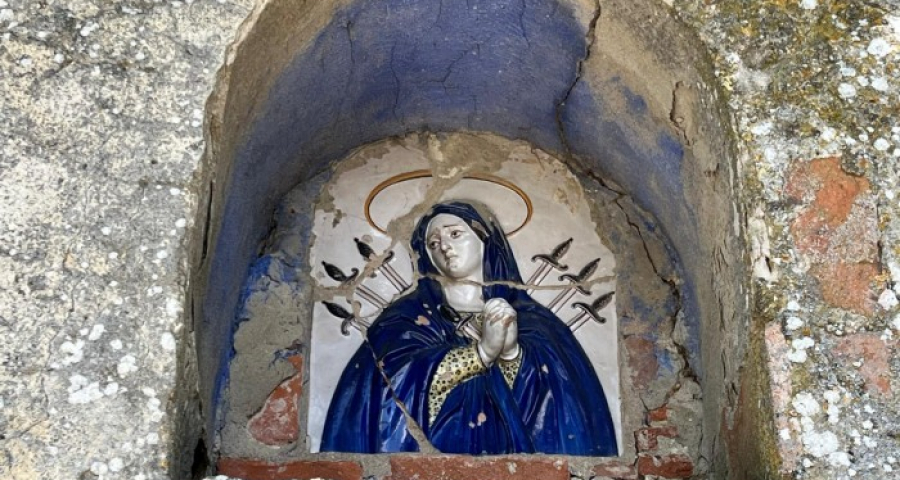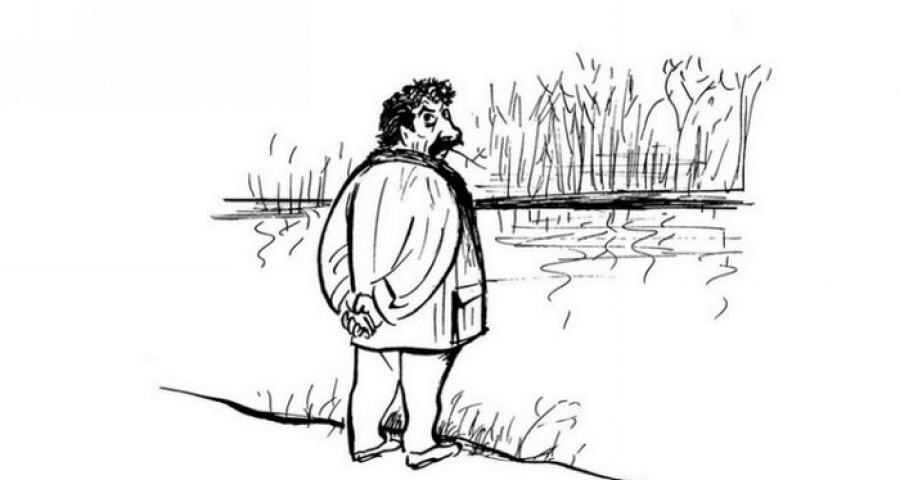Narrative Economics /10 - The extraneousness of the humble with respect to the codes of the educated classes (and the Church) produced a disorientation that is still present today
by Luigino Bruni
published in Avvenire on 15/12/2024
«We continue undaunted to make history as if the men who preceded us, all of them, had lived for nothing other than to produce us; as if this year's flowers could claim that past springs, all past springs, had no flowers of their own, but only humbly succeeded one another with the superb aim of preparing with their flowers of transit and trial the flowers of this year, our flowers. We are unable to look with respect at those who have gone before us and think that, perhaps, they had achieved a perfect life, more perfect than ours. The history of piety is able to teach us such modesty... Man, in his relationship with God, can reach his own most perfect fulfilment without first having to have progressed the whole of humanity in order for him to reach it.».
Don Giuseppe de Luca, Introduzione all’archivio per la storia della pietà, p. XLVII
In the mayor's confrontation with don Camillo, Guareschi shows the distance between the language of the educated and that of the people. And the way to bridge it.
The word is at the origin of civilisation. Homo sapiens, an animal capable of speech, was able to do extraordinary things because, perhaps 100,000 or 150,000 years ago, he began to speak. Language facilitated and refined communication within and between human groups, hence cooperation. In the beginning, then, it was speech. After a long time, the oral word also became the written word, and with it came the scribes, the specialists and masters of speech, and those who could translate words into signs held great power. Most people continued to speak, but only a small elite could also write. Between the oral and written word, between the speakers and the writers, a moat, a conflict, was thus created. The scribes then created the orthographies, the grammars, the syntaxes, and the masters of speech defined what was the right way to write and speak. The written word was born from the oral word but it was the writing that ruled over the oral word. Don Camillo, by vocation and task, was on the side of the scribes, not that of the ignorant people. Peppone, on the other hand, was a man of the spoken word, of the dialect. This contrast emerges with great force from one of the most beautiful stories in ‘Mondo Piccolo’: The Proclamation.
Peppone, after an ‘accident’, had prepared a proclamation to be posted in the village. Don Camillo came into possession of the draft; he read it and saw that it was riddled with errors: ‘Again last night a vile anonymous hand wrote an insulting insult on our wall paper. ... If he does not stop it, he will have to regret it when it is irreparable. All patience has its limits.The Secretary of the Section, Giuseppe Bottazzi’. Back in the presbytery, Don Camillo comments on it with Jesus: ‘Isn't it a masterpiece?’. ‘Everyone expresses himself as he can,’ Jesus replied. ‘It is not licit to expect someone who has only done third grade to pay attention to linguistic nuances‘’ (Piccolo Mondo. Don Camillo, 1948, p. 12). In this dialogue on Peppone's proclamation, themes that are still at the heart of justice, schooling, and the pain of the poor are concentrated. The poor, all the poor of the earth, those whom Silone called ‘boors’, have in common a deep and widespread sense of inferiority that stems from incompetence in the official language, especially in the written language. In my small village in Ascoli, as in almost all Italian villages, people spoke in dialect. Almost everyone, but especially the peasants, the workers, the poorest. With my grandparents I only spoke in dialect, and I still speak it in my dreams. I saw and read my first book at school, because books were in the homes of the few lords, not in working-class homes like mine. In that ‘small world’ dialect was enough, nothing was missing. But I still perfectly remember my grandparents‘ and uncles’ (and my own) emotions when, in a rare encounter with a ‘gentleman’, they had to leave their mother tongue and try to speak in Italian.
They immediately lost all their eloquence, they were ashamed because that incompetence in the Italian language became incompetence in thought, in relationships, in dignity, an incompetence that the educated called ignorance: ‘we are ignorant’, ‘we are boors’, became the words to describe their indigence. When my grandparents spoke in dialect, they did not feel ignorant. They did not know the history of the Babylonians, they did not know the works of Foscolo and Leopardi, nor algebra; but they knew other things very well and were proud of it, above all they were proud of their knowledge of their craft, animals, plants, people, the earth and nature. When they went to church there they felt doubly ignorant: they did not understand Italian well and they understood nothing of Latin. So they did not understand the religion of the theologians, and for them only the saints, Our Lady, Jesus crucified remained. That esoteric language alienated people more than the pulpit and the altar already did, and separated the sacred from the profane, the sacred from the profane. Religion, from this perspective, increased the gulf that separated the poor from the scribes, those who ‘just talked’ from those who ‘talked and wrote’. It was the arrival of written languages that invented the ugly word ‘illiterate’, because in the world of the word no one was illiterate. The peasants and the poor were masters in their own language, they felt at home among their few but living words, they were illiterate only in the language of the scribes - it is still possible, in certain regions, to witness old peasants reciting in dialect, or dialogues in bars and homes, with extraordinary lexical mastery and richness. When schooling became universal and compulsory, at first the linguistic shame of the poor was not reduced but increased. Because studying until the second or fifth grade did not give sufficient competence in the new language while it increased the perception of one's own deficiency. Within the Constitution and Democracy there is also this specific suffering of the poor, the migrants from the South, the ‘cafoni’, who experienced a strong linguistic disorientation that immediately became a disorientation of self-esteem and dignity. Today we can still sense something of that distant pain and disorientation if we can enter the hearts of first-generation immigrants and their children. All too often that ancient shame is still reborn in them, which is sometimes amplified by those - people and institutions - around them behaving as Don Camillo wanted to behave with Peppone.
Continuing his dialogue with the crucifix, don Camillo confesses his sin: ‘Peppone,’ Jesus tells him, ‘is talking about an insult that someone wrote on his wallpaper. When you, last night, went to the tobacconist's, didn't you happen to pass by that mural newspaper? Try to remember'. ‘Actually yes, I did pass by there,’ Don Camillo frankly admitted.’ ‘And when you left, don Camillo,’ replied Christ, ’did you see if there was anything strange written there?’ And don Camillo: ‘Thinking back, it seems to me, when I left, that I saw that there was something scribbled on a sheet of paper in red pencil’. Pushed into a corner, he is about to interrupt the dialogue-interrogation: ‘Compermesso: I think there are people in the presbytery’ (p. 14). But Jesus stops him: ‘Don Camillo!... So what?’. ‘‘So, yes’, muttered Don Camillo, ‘... it slipped out “Peppone the donkey”...’. And Jesus: ‘Peppone took the piss out of you yesterday and tomorrow he'll take the piss out of the whole town again... and all because of you. Do you think that's nice?’ (p. 15). Don Camillo commented: ‘All right: but for general political purposes ...’. And Christ: ‘I'm not interested in general political ends, for the purposes of Christian charity, giving people reason to mock a man for the fact that this man has only got as far as third grade is a big load of rubbish, and you are the cause of it, don Camillo’. Yes, don Camillo, Jesus is quite right: it is really a big rubbish!
These pages make Mondo piccolo and its author great. That Italy and a good part of the world were in Peppone's condition. In this tale, he is the victim with whom Guareschi asks us to empathise, to enter his bowels - to ‘delude ourselves’, Dante would say. Guareschi was, socially, on don Camillo's side. He was a writer, the son of a schoolteacher, he belonged to that very small bourgeois elite that mastered language and culture. But, because of the artistic daimon that inhabited him and his popular origin that he cultivated throughout his life, he was able to rise up in that character of his. He entered the souls of the many men and women of his time and there he encountered that special pain that comes from the shame of speech. And he was also able to resurrect don Camillo with him. Here he is at the end of the story: ‘Lord, what can I do?’ said don Camillo. ‘Let him who does sin do penance. Do penance’ (p. 15). Don Camillo returned to the rectory, and there something unprecedented happened: Our Lady entered his Little World. ‘He turned to the statuette of Our Lady. 'Madam, please help me. ‘This is a matter strictly for my Son,’ whispered the little Madonna. 'I cannot meddle in it. Put in a good word. I'll try‘, she replied’ (p. 15). If we think of the intercession of the saints and Our Lady with the categories of Counter-Reformation theology, we do not understand it, and we run away from it. But if we think of it with the heart, the mind, the tears and the pain of the people and the poor, then we can understand that what religion calls ‘intercession’ is, in reality, a meeting of good words, almost always spoken in dialect. They are prayers, psalms, different cries, hope of last resort.
Here's the answer: suddenly Peppone arrives at the church: ‘Listen... There's a scoundrel in the village, a black coward, a Judas Iscariot with a poisonous tooth, who every time a paper with my secretary's signature appears on our register, he enjoys writing “Peppone asino” on it’ (p. 16). Peppone addresses to don Camillo a beautiful and very human request for help: ‘Since I don't feel like being an ass, you should have a look at the draft of the proclamation before Barchini [the printer] prints the manifesto’ (p. 17). Peppone handed the draft to don Camillo, who ‘took the pencil and carefully corrected the draft’. ‘How much do I owe you?’, “nothing”, answered don Camillo. And Peppone: ‘I will send you some eggs’. The different reciprocity of the honest, made up of few words and many silent gestures.
Back in the rectory, don Camillo passed by to greet Jesus, who asked him: ‘How did it go?’. ‘A bit rough, but good. Peppone doesn't even remotely suspect that it was me last night’. ‘Instead he knows very well,’ retorted Christ. ‘Always you and all twelve times. He even saw you a couple of evenings' (p. 18). Peppone had seen him, but remained hidden because he really felt like an ass, and was ashamed. This is the deep suffering of the poor, which we can no longer even understand. And so, unlike don Camillo, we do not convert and correct the poor's drafts with a pencil.













